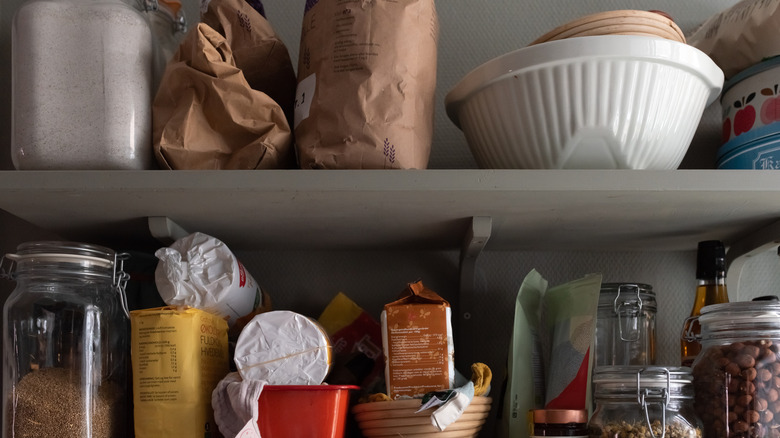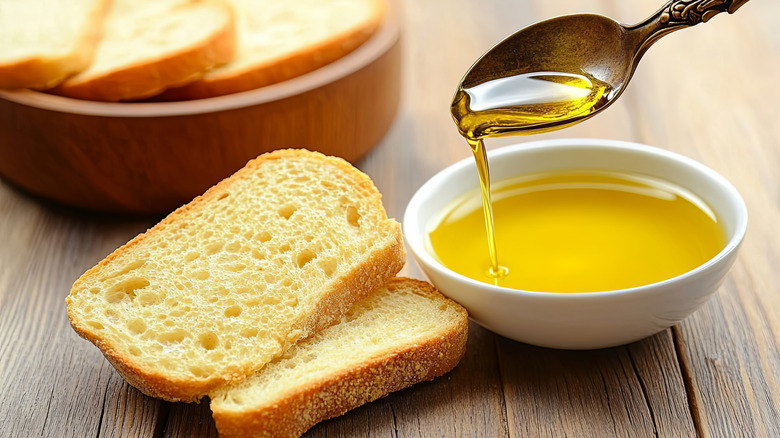The Kitchen Staple You Need To Keep Far Away From The Fridge
Based on consumption data, olive oil has become one of the beloved kitchen essentials in American households in recent years. Because it's silky, flavorful, and highly versatile, you can use it in almost anything, from dips and salad dressings to frying and baking. And due to its many health benefits, it is considered the golden standard in healthy cooking fats. However, there's something you need to know about olive oil and the best place to store it. While it's true that olive oil, or any other kitchen oil, for that matter, should be stored in a cool, dark place, that does not mean it belongs in the refrigerator.
The cold temperature inside the fridge can cause olive oil, including extra virgin olive oil, to solidify, cloud, or crystallize. While this does not ruin the oil, it can be annoying when you need to use it, because it does not come out of the bottle like it's supposed to in its liquid state. You will then have to wait for it to thaw before you can smoothly pour it out of the glass bottle. The same is true for when you store your olive oil in a squeeze bottle. You need to wait a little bit before you can easily pinch it out of the plastic container.
What refrigeration can do to olive oil
If you've left olive oil in the fridge, you've likely seen it become thick, cloudy, or even buttery in texture. This is because olive oil — as well as other cooking oils — starts to solidify at around 54 degrees Fahrenheit. While this transformation doesn't significantly alter the oil, it affects how it performs when cooking or dressing dishes. Although olive oil returns to its liquid form at room temperature, repeatedly cooling it in the fridge and warming it can degrade its quality over time.
Temperature fluctuations put unnecessary stress on the oil because it introduces condensation inside the bottle. The moisture can promote oxidation and microbial growth, which is especially unpleasant if you like to dip or pour directly from the bottle during use. Eventually, you'll start to see the telltale signs that your olive oil has gone bad: a murky color or sour, "off" smell.
Refrigerating olive oil is also just plain inconvenient. Imagine preparing a quick dinner only to find that you left your olive oil in the fridge. It would be too solid to drizzle or measure at that point, so you'd have to play the waiting game before you can use it.
One could argue that freezing olive oil isn't that bad. In fact, one kitchen hack suggests freezing it in small potions (like in ice cube trays) for long-term storage or infusions. However, this is more of a workaround than a best practice for everyday use in the kitchen.
The best way to store olive oil
To preserve the quality of your olive oil and keep it tasting its best, treat it the way you'd treat coffee beans or wine: Store it smart. The perfect storage area for olive oil is a cool, dark cupboard or pantry, away from the cold of the fridge, the heat of the stove, or the light from a sunny window. You should also seal the bottle tightly to prevent air and moisture from seeping in.
If you buy olive oil in bulk, you need to prepare to store a large volume of your supply long term. It's wise to invest in dark-colored bottles, like green or amber glass, as these block light. If you're buying high-quality extra virgin olive oil, choose a small container that you can finish within a few months of opening. Olive oil starts to oxidize and lose its flavor the moment you open the bottle. That's why it's important to seal the cap every after use.
Another smart tip is never to leave your olive oil sitting out on the kitchen counter, especially near the stove. The heat from the stove can raise its temperature and break down its nutrients. However, if you like the look of an olive oil bottle or dispenser on your countertop, refill it only with an amount you can consume in a week or less.


